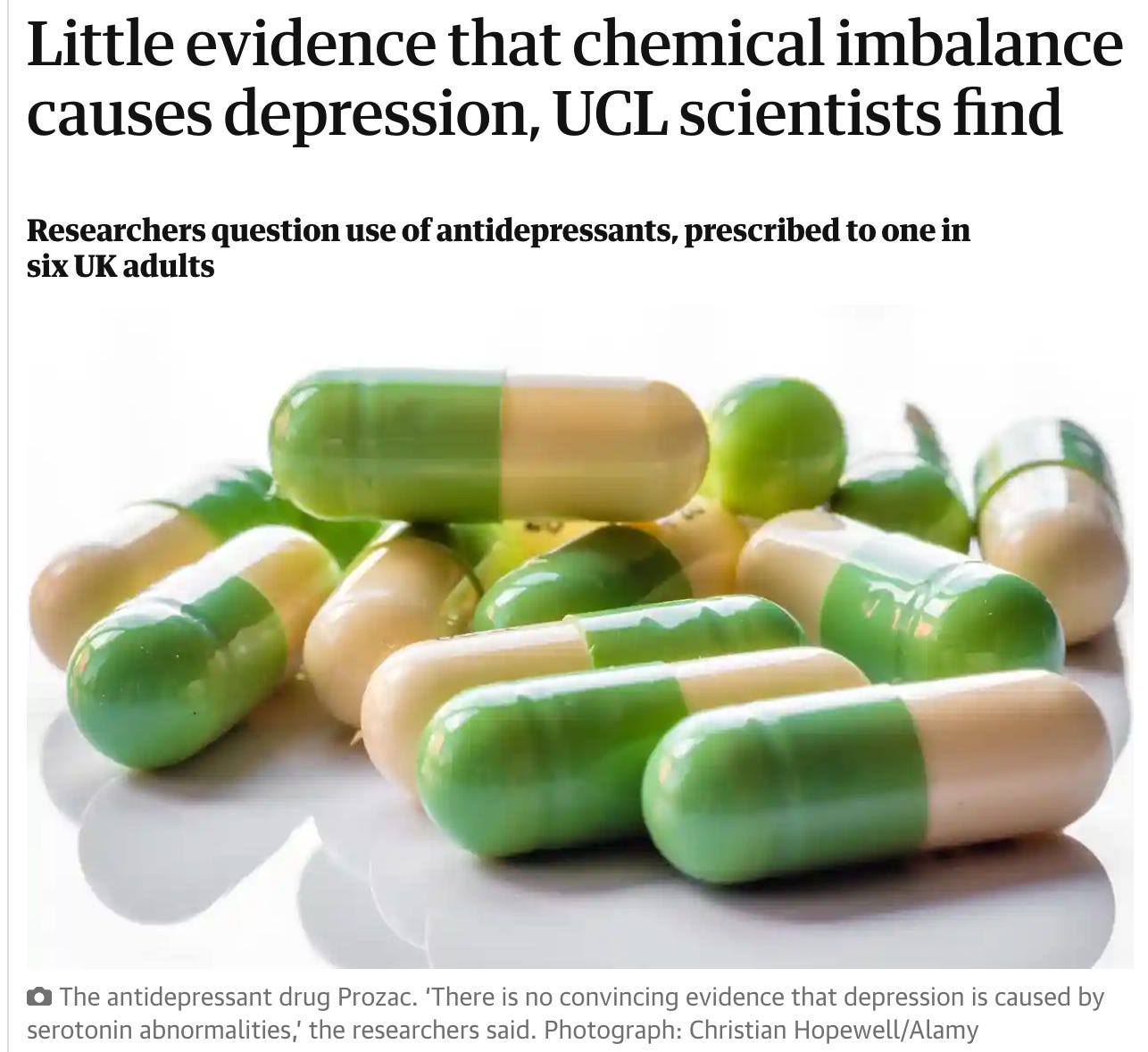Sliding doors
The publication of Prozac Nation was a societal inflection point that ushered in multiple pharmacological disasters
I. The Promise
In the late 1980s/early 1990s my parents spent a small fortune to send me to what was, at the time, the top-ranked small liberal arts college in the country. While the Ivies train up the future ruling class, small private liberal arts colleges offered something far more alluring.
Hanging in the air at these small private colleges was a promise that went something like this: the social sciences, particularly psychology and sociology, have figured things out. If we just follow their wise teachings, we will emerge in a utopian society where there is depth and meaning, people are decent and real with each other, differences are worked out (through “I” statements and “position switching” amongst other tools), and above all people are happy.
I imagine it began with Freud and Jung, accelerated with Foucault and Butler, but it was also present in the pragmatic psychologists including Barry Schwartz and the later happiness researchers.
The promise co-opted the central notion of many 20th century revolutions — that a new man and new woman were being born from the ashes of the old system and that we would find better ways of relating to each other than any society heretofore.
This promise was EVERYWHERE — from the new student orientation to the mandatory date rape prevention workshops to resident advisor trainings to student clubs and late-night conversations in the common areas of the dorms. A better world was possible and we were the ones to usher it in. The promise was going to radiate out to the rest of society like a pebble dropped into a pond.
It’s heartbreaking to reflect on this now because: 1.) the promise was never fulfilled (perhaps because it was always just a fantasy); and, 2.) to the extent that this vision soldiers on in some form it has taken an incredibly dark turn and now resembles fascism more than anything else.
II. An inflection point
Elizabeth Wurtzel was a fierce talent. Yes, she went to Harvard but she was the embodiment of the promise. A third wave feminist, she was unabashed in her celebration of sexuality and pleasure. As a writer she was a sorceress — able to pull magic, truth, and wisdom out of thin air.
Ms. Wurtzel popularized the Pain & Suffering Memoir genre with the publication of her book Prozac Nation in 1994. The book was raw, confessional, and witty. It felt like she had discovered capital T Truth. She went inside, as the psychologists (and Buddhists) had trained us to do, explored her emotional pain with all of its searing intensity, and redeemed it by giving it meaning. Ms. Wurtzel modeled how to be vulnerable, ironic, and strong. By the end of the book she was our friend and shrink. She had gone through the dark night of the soul and had come out on the other side, victorious.
I loved Prozac Nation and I’m devastated by what has transpired since.
III. The misuse of a once-in-a-generation talent
There was always a strange sleight of hand involved in Prozac Nation. In spite of the extraordinary psychological heavy lifting for over three hundred pages — the remedy in the end was a magic little pill.
In retrospect, Elizabeth Wurtzel and all of us got played by the most corrupt industry in the history of the world.
The success of Prozac Nation was not an accident. For a while, the book was everywhere — on magazine covers, on all of the chatty morning shows, and in doctors’ waiting rooms. It was part of a wave of books including Listening to Prozac that assured the public that the scientists have it figured out and this magic little pill will make all of your troubles go away. I am almost certain that behind the scenes Pharma spent millions of dollars to promote this book and turn Ms. Wurtzel into a household name.
With the success of Prozac Nation an entire generation abandoned the century-long promise of the social sciences and said, “just write me that script doc.”
The tragedy of Elizabeth Wurtzel is that Pharma took a spectacularly talented thinker and writer and used her to betray her whole generation. The end result has been the gradual enslavement of Generation X (and the rest of society) to the cartel.
IV. The demise of Elizabeth Wurtzel
Things did not turn out well for Ms. Wurtzel. Her next book was Bitch: In Praise of Difficult Women. Apparently, the Prozac had stopped working so she resorted to snorting upwards of 40 crushed Ritalin tablets a day — and when that didn’t work she turned to cocaine. That led to rehab and another memoir — this time about dealing with addiction (More, Now, Again: A Memoir of Addiction). By this point she had lost the plot to her own story. She managed a brief reset by going to Yale Law School (always the best) and working for super lawyer David Boies for a few years. At 47 she developed breast cancer and she wrote about that in her trademark style. At 52 she was dead from leptomeningeal cancer.
(Photo credit: Dan Callister/Shutterstock)
In all of her brilliant writing, Ms. Wurtzel never criticized the white coats nor their pharmaceutical handlers in spite of the myriad ways that they failed her. Ms. Wurtzel blamed the BRCA gene mutation for her breast cancer and praised the heroic doctors and scientists who identified it and treated it (with a double mastectomy and reconstruction surgery).
The BRCA gene mutation very well could be the cause of her death. But there is another explanation that is also plausible — one that is not allowed in the mainstream media. Prozac is a fluoride compound (fluoxetine). Fluoxetine is 18.5% fluoride by weight.
Fluoride is toxic. Ms. Wurtzel’s miracle pill was actually depositing poison into her bone marrow, brain, thyroid gland, lymph nodes, fatty tissue, and vital organs, day after day, year after year.
It never cured her depression — any gains were short-lived and supplemented by drugs and alcohol.
The entire story of Prozac Nation was based on a toxic and deadly lie.
V. The legacy of Prozac Nation
Things did not turn out well for the rest of us either.
Psychiatrist David Healy figured out the scam early on and went to great lengths to alert others with books including Let Them Eat Prozac (2002) and Pharmageddon (2004). He was later joined by Peter Gøtzsche (Deadly Medicines and Organized Crime, 2017) and many others.
But it took 30 years before the mainstream media admitted what was knowable on the first day — these products do not work as advertised. Even the usually reliable Pharma mouthpiece, The Guardian, was recently forced to admit that the entire theory of the case in connection with Selective Serotonin Reuptake Inhibitors was just glorified marketing copy:
The study in Molecular Psychiatry on which that article is based is (here). If you click through to read The Guardian article you’ll see defenders of the status quo at the end explaining that ‘it works even though there is no evidence that it works.’ Sound familiar?
By this point, about 1 in 5 American women and 1 in 10 men are on these drugs. They are given to pregnant women even though they are linked with autism (see literature review in my thesis). People are on them for decades in spite of no safety studies on long term use. They create dependency and once started, it is very difficult to stop.
It was not a foregone conclusion that Prozac would take off in the United States. German regulators (who actually examined the underlying data) rejected it and it was only approved in Sweden through outright bribery. But FDA regulators were primed to look the other way. In the meantime, Ms. Wurtzel made mental illness and these magic fluoride capsules sexy and cool. One can see how this set the stage for normalizing the other mass poisoning events that followed.
The adoption of SSRIs followed a pattern. Pharma pushed them, the FDA blessed them based on shoddy studies, the media and trusted messengers promoted them, and society gobbled up that snake oil like candy. Anyone who questioned the grift was shunned.
There was just too much money to be made for anyone to do the right thing. Once the pattern was set, more pharmacological disasters soon followed.
Next we were told that opioids, including OxyContin®, were not addictive. Once again the FDA blessed them based on shoddy data, the media promoted them, and society took these pills in massive quantities. On average, every year the U.S. now loses more Americans to opioids than died in combat in the entire (decade-long) Vietnam War.
Now it is happening yet again with Safe & Effective™️ Covid-19 shots that disable and kill at an astonishing rate. There is just so much money to be made from poisoning society that Pharma (+ the media and the political system that they own) cannot resist.
And millions of people who once believed in the promise of a better society are now mindless zombies who just want more pills, more injections, and more drugs to cure the human condition. But even that’s not enough — they want a society where Pharma idolatry is enshrined in law and everyone is forced to obey (setting up Pharma totalitarianism is basically the entire purpose of the California Democratic Party at this point).
VI. Sliding doors: imagine if Elizabeth Wurtzel had chosen differently
Hindsight is 20/20 and Ms. Wurtzel is not here to defend herself. But she was so incredibly talented. One can imagine a world where she might have chosen differently. Imagine if she had said, now wait, hang on, you’re telling me that several millennia of philosophy and a century of psychology are nonsense and that these drug dealers can solve the human condition with fluoride? That seems far-fetched.
One can imagine a world where Ms. Wurtzel used her fierce intellect to actually read the junk science clinical trials and study the FDA sham regulatory process instead of just surfing the zeitgeist. Any amount of honest due diligence would have quickly raised extraordinary doubts.
But the promise of magic pills was irresistible — for Ms. Wurtzel, society, and the drug dealers in white coats who stood to gain billions of dollars.
I want to be clear that it is not the responsibility of a 26 year old creative writer to save civilization. There should have been some adults in the room at her publisher (Houghton Mifflin) or the FDA who could have tapped the brakes on the rush to promote a fluoride compound as some sort of miracle cure. Ms. Wurtzel was uniquely influential but there were hundreds of thousands of others who also made ethically questionable choices in connection with this product. Furthermore, Ms. Wurtzel’s impulsiveness suggests that she may have already had some neurological damage, perhaps from the 10 to 13 shots that were common for Generation X. So perhaps she physically could not have chosen otherwise.
On the other hand, warrior mamas and Covid critical thinkers perform proper due diligence every day. As a result we are attacked by the mainstream media, hunted by the cartel, censored by the Stasi, and blacklisted by corporations and government. I guess if Elizabeth Wurtzel had chosen otherwise we never would have heard of her and they would have promoted someone else to fill that trusted spokesmodel role.
Here’s what I cannot figure out. Was the promise (that I began this article with) always a lie? Is the human condition such that we are always at the mercy of primitive instinct? Conservative Presbyterians believe in the doctrine of “total depravity” — that human beings are always flawed and fallen and the best we can hope for is divine grace that cannot be earned. Are they right?
I confess that I still believe in the promise (even though the last two years have shown me mountains of evidence that it’s not possible). I want to believe in a world where people are decent to each other, where we can find better ways to relate to each other that reduce strife and provide meaning and connection. It’s a far cry better than the alternative — magic pills & injections that are actually deadly, promoted by an entire society built on lies.
Blessings to the warriors. 🙌
Prayers for everyone working to stop the iatrogenocide. 🙏
In the comments, please let me know what’s on your mind.
As always, I welcome any corrections.
(I’m an Amazon affiliate so any purchases made by clicking on book titles above pay me a tiny commission.)









I doubt whether Generation Z will ever be able to produce writers like Ms. Wurtzel because all of the dendrites necessary to generate great literary works are dead as a result of the 54 shots on the CDC schedule.
In the end, the small liberal arts college was the unhealthiest place I’ve ever been before or since. Masochistic and sadistic behaviors, eating disorders, and self-harm were common. Racism and rape were part of the fabric of the place. There were lots of people who were high functioning on the autism spectrum who struggled socially. Perhaps the promise was just a smoke screen to distract us from our lived reality?